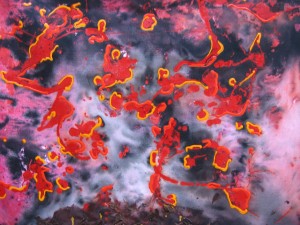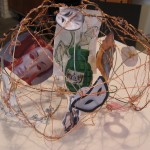Biol 101 General Biology
 Biology is a vast field, extending from the interactions between molecules to the interactions within ecosystems on our plant. This first semester of General Biology focuses on molecular and cellular aspects of biological organisms. We will survey the biochemical processes and cellular features common to all organisms (or to a large group such as plants). The concepts covered in this course include macromolecules, cellular organelles, signaling and metabolic pathways, reproduction and genetics, the molecular pathways underlying inheritance, and biotechnology. Laboratory exercise reinforce the course material and allow students to apply their learning in investigative exercises. I developed a module for Biology 101 laboratory that integrates with student-led research on alcoholism. Links below are for a poster presented at SfN Fall’10 and an article in DIS that describe this module and student project. As of 2019, I am not longer teaching this course as I transition to developing a course in Quantitative Biology
Biology is a vast field, extending from the interactions between molecules to the interactions within ecosystems on our plant. This first semester of General Biology focuses on molecular and cellular aspects of biological organisms. We will survey the biochemical processes and cellular features common to all organisms (or to a large group such as plants). The concepts covered in this course include macromolecules, cellular organelles, signaling and metabolic pathways, reproduction and genetics, the molecular pathways underlying inheritance, and biotechnology. Laboratory exercise reinforce the course material and allow students to apply their learning in investigative exercises. I developed a module for Biology 101 laboratory that integrates with student-led research on alcoholism. Links below are for a poster presented at SfN Fall’10 and an article in DIS that describe this module and student project. As of 2019, I am not longer teaching this course as I transition to developing a course in Quantitative Biology
Biol 101 Syllabus-Fall 2012
SfN10 Alcohol Poster Reynolds DIS255
FYS 118 Fear
This course will take an interdisciplinary approach to an understanding of fear as a primary emotion and as an influence on our behavior. We will start out by defining fear and looking at our own personal fears and phobias. We will try to understand the line between healthy aspects of fear and fear that interferes with normal life function. In the next big chunk of the course, we will explore the neurological basis for emotions in general and fear specifically. We have to have a firm understanding of neurological processes to understand the role of emotion such as fear. Because it is so primal, fear is often used as a learning paradigm in animals and we will examine the interaction between fear and learning/memory and the implications of this connection. In the second half of the semester, we will look at several aspects of fear and society. We will use the medium of the horror film to examine how societal fears are reflected in popular culture. We will also discuss how this basic emotion may be manipulated to influence behavior and ideas. The basic goal of these studies will be to learn how to approach a subject from multiple perspectives and to analyze critically the basic ideas associated with the subject. In particular, I hope to encourage students to think about how scientific knowledge may fundamentally alter their view of society. We will discuss books, articles, films, videos and each others’ work to learn and form opinions about fear. We will express those ideas and opinions through writing assignments, presentations and art projects.
FYS 2017
Neur 201 Intro to Neuroscience
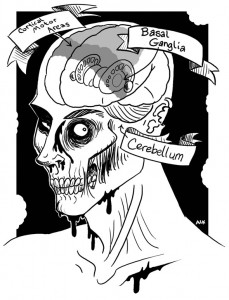
This course takes a problem-based introduction to the field of neuroscience. The basic problem that will be our focus for the semester is consciousness. We will first attempt to define what we mean by consciousness and look at historical perspectives on this concept. Then, we will focus on a scientific, neuroscience approach to the problem and to accumulate the knowledge necessary to begin to address this problem. We will look at a current theory of consciousness based on this scientific approach, and then look at alternative hypotheses including those that are brain-based and those that are not. Finally we look at some of the manifestations of consciousness thought towards our human endeavors.
Neur 201 syllabus 2019
Biol 256 Neurobiology
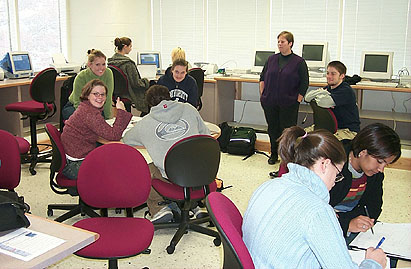 This course examines the field of neurobiology from a cellular and molecular perspective with the neuron, the functional cellular unit of the nervous system, as the focus of discussion and experimentation. After a review of basic neuronal cell biology, the course will examine the means by which this highly differentiated cell mediates information flow through synaptic transmission. Finally we examine the development of the nervous system and the interaction of genetics and environment that constantly fine tunes the functioning of nervous system and synaptic connections throughout life. These objectives will be meet through lectures and class discussions; readings in our textbook and reading, analysis and criticism of primary literature articles; computer simulations of physiological processes; and the application of our knowledge in laboratory exercises and presentations. Prerequisites for this course are Biology 101 and Neur 201 and it is intended for intermediate science students.
This course examines the field of neurobiology from a cellular and molecular perspective with the neuron, the functional cellular unit of the nervous system, as the focus of discussion and experimentation. After a review of basic neuronal cell biology, the course will examine the means by which this highly differentiated cell mediates information flow through synaptic transmission. Finally we examine the development of the nervous system and the interaction of genetics and environment that constantly fine tunes the functioning of nervous system and synaptic connections throughout life. These objectives will be meet through lectures and class discussions; readings in our textbook and reading, analysis and criticism of primary literature articles; computer simulations of physiological processes; and the application of our knowledge in laboratory exercises and presentations. Prerequisites for this course are Biology 101 and Neur 201 and it is intended for intermediate science students.
Biol 256 Syllabus-Fall2019
Biol 256 Syllabus-Fall2020 Remote version
Neur/Art 275 Art, Neuroscience, and Consciousness
Art and science share a long history of similarity in process and in cross-fertilization of ideas that is not obvious in the current practice of each discipline. We will develop the students’ sense of connected history and the current intersection between the fields. We will explore various perspectives about the connections between the fields that have existed over time before moving to examine the current interaction between art and neuroscience in understanding visual processes, perception, self, creativity and consciousness. We will also look at how the fields can work together to produce models to further our understanding of these topics. The class will combine readings, discussion and projects that look at observation, representation and modeling. Students will benefit from the cross-disciplinary design taught by multiple faculty. Participation in the course will provide a rare opportunity for students to intensively study the interconnection between two disciplines with a team of instructors.
Art-Neur 275 Fall 202 Syllabus Remote version
Biol 310 Aging and Age-related Disease
 Most of the study in the field of developmental biology concentrates on the development of form and structure during embryonic stages. But after birth, organisms continue to grow, mature, and eventually die. In particular, the developmental progression of the brain from birth through the adult years and on into senescence has become a focus for the study of postembryonic development. The brain undergoes many developmental modifications over the course of an adult lifetime and many of the diseases of the brain occur later in that lifespan. In this course, we will explore the normal aging process as defined by changes in the anatomy, physiology, and biochemistry of the brain and age-associated changes in behavior. We will also look at diseases associated with the brain’s aging processes. The basis for our learning will be the formation of questions, literature searches that result in student-led discussions of the current literature, and field experiences with aging populations. This fieldwork will take place through training and service opportunities at local facilities and we will specifically discuss the place of such service in our learning. Each student will develop an area of expertise, which they will share with the class. The course will also include written criticisms of the literature, including a final paper that reviews the literature in the student’s chosen area of expertise and reflects on the integration of the literature with the student’s field experience. Students will be expected to be active participants in their own learning and through integration of the cumulative backgrounds of the participants, we will seek a greater understanding of the current state of knowledge in this field.
Most of the study in the field of developmental biology concentrates on the development of form and structure during embryonic stages. But after birth, organisms continue to grow, mature, and eventually die. In particular, the developmental progression of the brain from birth through the adult years and on into senescence has become a focus for the study of postembryonic development. The brain undergoes many developmental modifications over the course of an adult lifetime and many of the diseases of the brain occur later in that lifespan. In this course, we will explore the normal aging process as defined by changes in the anatomy, physiology, and biochemistry of the brain and age-associated changes in behavior. We will also look at diseases associated with the brain’s aging processes. The basis for our learning will be the formation of questions, literature searches that result in student-led discussions of the current literature, and field experiences with aging populations. This fieldwork will take place through training and service opportunities at local facilities and we will specifically discuss the place of such service in our learning. Each student will develop an area of expertise, which they will share with the class. The course will also include written criticisms of the literature, including a final paper that reviews the literature in the student’s chosen area of expertise and reflects on the integration of the literature with the student’s field experience. Students will be expected to be active participants in their own learning and through integration of the cumulative backgrounds of the participants, we will seek a greater understanding of the current state of knowledge in this field.
Biology 310 Syllabus Spring 2019
Neur 401 Advanced Neuroscience
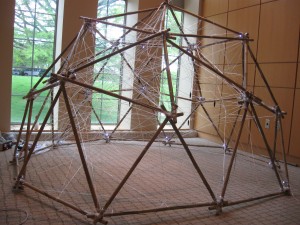 This capstone course for the neuroscience major builds upon information covered in Biology 256 and Psychology 323. Through reading of the neuroscience literature, writing and discussion, we will explore in greater depth the development, organization, and functioning of the nervous system. We will examine these subjects by investigating neurogenesis a form of plasticity. This course was taught originally by Dr. Wendy Hill and myself in 2002 with the goal of emphasizing the interdisciplinary nature of neuroscience as a scientific discipline that explores interesting problems at the interface between psychology and biology.
This capstone course for the neuroscience major builds upon information covered in Biology 256 and Psychology 323. Through reading of the neuroscience literature, writing and discussion, we will explore in greater depth the development, organization, and functioning of the nervous system. We will examine these subjects by investigating neurogenesis a form of plasticity. This course was taught originally by Dr. Wendy Hill and myself in 2002 with the goal of emphasizing the interdisciplinary nature of neuroscience as a scientific discipline that explores interesting problems at the interface between psychology and biology.
The brain is “plastic”—in other words, the brain is able to make structural and functional adaptations in response to experience. Adaptation takes place at the level of the synapse and more recent experiments suggest that adaptation also involves the placement of new neurons within existing neural networks. We will first explore neurogenesis as it occurs in embryonic development. We will then discuss the approaches used to investigate adult neurogenesis, specifically in crayfish, birds, mammals and primates (including humans), and how these findings fit into the general model of a “plastic brain.” Finally, we will examine some of the factors that influence adult neurogenesis and explore how neurogenesis may play a role in human disease. Throughout the semester we will pay particular attention to discussion of current research findings in this exciting area and to reading about advanced laboratory techniques used by neuroscientists studying neurogenesis.
Advanced Neuro Syllabus 2016
Link to 2016 Website
Link to 2015 website
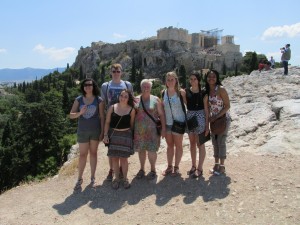 INDS 224 Greek Stories
INDS 224 Greek Stories
This course is designed to introduce you to the history, cultures, and landscapes of Greece. In classical times, Athens was a powerful city-state that produced magnificent works of art, architecture, history, mathematics, philosophy, and literature; the city gave birth to the idea of democracy, but at the same time was an imperialistic, slave-owning, and often xenophobic culture that accorded women few rights and freedoms. From 150 BCE until the 1820s, Greece was not a major force in the Mediterranean world, but instead was a subject colony, first of the Roman and then of the Byzantine, Ottoman and Venetian Empires. Since becoming a modern nation-state, Greece has struggled to preserve and promote not only its cultural, historic and artistic heritage, but also the natural beauty of the country. Economically one of the weakest and least stable members of the European Economic Community, Greece continues to be a magical and mythic place in the minds and texts of many writers, who remain fascinated by the nation’s historical sites and monuments, diverse topography, and unique blend of Middle Eastern and European cultures. Through readings, lectures and class discussions—and by traveling throughout Greece to see its many landscapes and sites of political, artistic, and archeological significance—you will have a chance to explore and reflect on ways that the cultures and landscapes of Greece have been viewed over time—both by the Greeks themselves and by outsiders. Paying special attention to the power of myths, legends and narrative, we’ll examine the stories the ancient Greeks told about nature and human nature and discuss the impact these stories have had upon Western European literature, philosophy, politics, and scientific enquiry. The course is truly interdisciplinary, with readings covering such topics as ancient Greek art and theatre, contemporary ecotourism, the Greek diet, and oceanographic and archeological explorations on Crete and Santorini.
Greek Stories Syllabus 2018
Research Courses
Biol 401/402, Neur 391/392, 491, 492
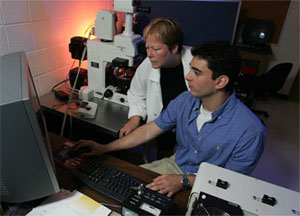 These courses allow students to pursue research interests in collaboration with a faculty member. Neur 391/392 are intensive courses that allow students to study a topic through web-based literature search and reading and review of the neuroscience literature. The other courses provide student with a laboratory research experience where students are involved with designing and carrying out experiments over multiple semesters. Please see the research projects I currently have in place to determine if you have an interest in these areas. If then you are interested in doing research with me, I would suggest taking one of my courses and discussing your interest with me. Keep in mind that I cannot accommodate every student’s wish to join my lab. I often base my decision to accept a research student based on our interaction in the classroom. We will discuss your interests and motivations in a meeting .
These courses allow students to pursue research interests in collaboration with a faculty member. Neur 391/392 are intensive courses that allow students to study a topic through web-based literature search and reading and review of the neuroscience literature. The other courses provide student with a laboratory research experience where students are involved with designing and carrying out experiments over multiple semesters. Please see the research projects I currently have in place to determine if you have an interest in these areas. If then you are interested in doing research with me, I would suggest taking one of my courses and discussing your interest with me. Keep in mind that I cannot accommodate every student’s wish to join my lab. I often base my decision to accept a research student based on our interaction in the classroom. We will discuss your interests and motivations in a meeting .
Biol/Neur 495, 496, Thesis
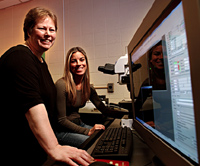 Only a few students every year successfully complete an honors thesis. If you are interested in working on an honors project with me, you should discuss the idea at least a year in advance of the fall you plan to start. Students usually work with me for at least a semester before undertaking honors. For these projects, the student and I collaborate on a project which the student researches, designs, carries out, analyzes and write up into a thesis. There is a formal proposal and thesis defense and a committee that oversees the project. These projects take time and commitment from the student and myself to complete within a year.
Only a few students every year successfully complete an honors thesis. If you are interested in working on an honors project with me, you should discuss the idea at least a year in advance of the fall you plan to start. Students usually work with me for at least a semester before undertaking honors. For these projects, the student and I collaborate on a project which the student researches, designs, carries out, analyzes and write up into a thesis. There is a formal proposal and thesis defense and a committee that oversees the project. These projects take time and commitment from the student and myself to complete within a year.
